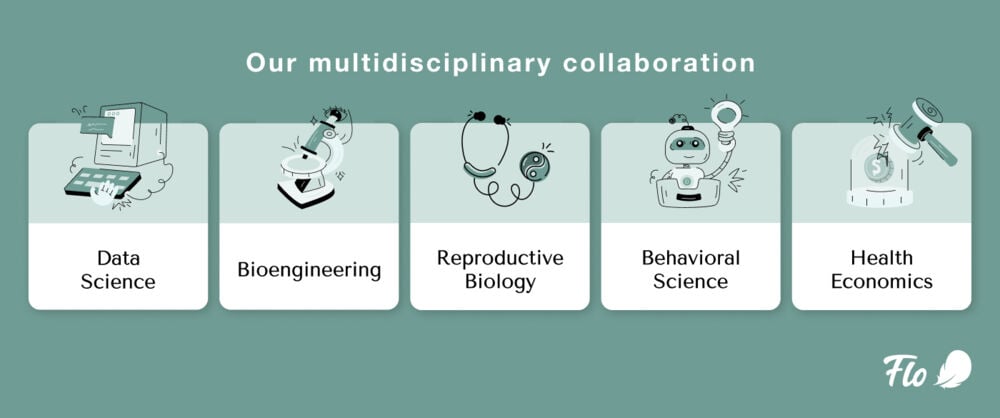-
Tracking cycle
-
Getting pregnant
-
Pregnancy
-
Help Center
-
Flo for Partners
-
Anonymous Mode
-
Flo app reviews
-
Flo Premium New
-
Secret Chats New
-
Symptom Checker New
-
Your cycle
-
Health 360°
-
Getting pregnant
-
Pregnancy
-
Being a mom
-
LGBTQ+
-
Quizzes
-
Ovulation calculator
-
hCG calculator
-
Pregnancy test calculator
-
Menstrual cycle calculator
-
Period calculator
-
Implantation calculator
-
Pregnancy weeks to months calculator
-
Pregnancy due date calculator
-
IVF and FET due date calculator
-
Due date calculator by ultrasound
-
Medical Affairs
-
Science & Research
-
Pass It On Project New
-
Privacy Portal
-
Press Center
-
Flo Accuracy
-
Careers
-
Contact Us
Behind the Scenes: Meet the Science Team Making Flo a Trusted Health App

What do a cell biologist, an epidemiologist, and a health economist have in common? It’s not the start of a bad joke — these are some of the experts behind the scenes at Flo.
As health tech becomes increasingly important in our lives, Flo’s science team is dedicated to developing an accurate, safe, and credible product while also setting new benchmarks in women’s health.
Read on to learn more about how the science team is transforming Flo into a reliable resource for women everywhere.
Bringing Together Unique Expertise for Women’s Health
Flo’s science team is a veritable melting pot of scientific expertise. Each member brings something unique to the table, blending knowledge from data science, bioengineering, reproductive biology, behavioral science, health economics, and more.

In a way, this multidisciplinary collaboration is one of the team’s biggest strengths. Yella Hewings-Martin, PhD, senior research scientist and medical writer, explains it best. “Within every group of scientists, you have complementary expertise because you don’t want clones of the same thing. You have scientists come together as a collective with slightly different areas of expertise.” With years of experience working in cell biology research followed by editorial roles in various health and tech companies, Yella is passionate about highlighting the importance of science communication in making health information accessible and trustworthy, which is a significant part of her work at Flo.
The team’s academic diversity goes a long way in building a health product that people can trust. It’s not about rushing features to market or claiming groundbreaking insights for the sake of hype. It’s about using the best available science to build tools that help women take charge of their health.

“As a scientist, you’re trained to be skeptical. Everything warrants investigation. Everything should be challenged,” says Aidan Wickham, PhD, lead research scientist. Aidan’s academic background includes a PhD in bioengineering and postdoctoral research in epidemiology and public health. “The biggest benefit that Flo has by having a dedicated science team is that we’re constantly challenging the information that we’re gathering, and I think that helps us build a better and safer product,” he adds.
Flo’s director of science, Liudmila Zhaunova, PhD, agrees. “Our aim is to ensure the features we’re building are accurate and based on science. We have to make sure that whatever we build in the app is scientifically validated because you can build a feature and claim that it has benefits for user health, but if you don’t test it, you’ll never really know.” Liudmila has worked at Flo for six years, but her experience in reproductive health goes back even further. She has a background in reproductive biology, concentrating on the molecular and genetic mechanisms behind female egg formation and testicular germ cell tumor development.
Adam Cunningham, PhD, lead research scientist, echoes how validation is at the core of everything they do. Adam has a background in genetics and psychiatry, focusing on rare chromosomal disorders. At Flo, he leverages his expertise in mental health and big data to advance Flo’s app features. “At a very basic level, it’s extremely important to be doing validation because otherwise, you can’t tell whether something’s working,” he says.
And validate they did. A major accomplishment for the team was publishing the results of a randomized controlled trial that evaluated the app’s impact on users’ health knowledge and well-being. “We looked at whether, overall, Flo helps women,” says Liudmila.
“We had two groups of women. One of them had been using the app for three months, and another was our control group (they didn’t have access to the app). We compared the outcomes. Those who’d been using Flo had much better health benefits, such as improvement in health knowledge, menstrual awareness, and well-being. Women with premenstrual syndrome or premenstrual dysphoric disorder also saw important improvements. By the end of the study, they had higher levels of knowledge of their condition, they said that they were able to manage their symptoms better, and they were also taking fewer days off from work or education. This was a really big finding for Flo because this is the gold standard to measure the impact of a product.”
Helping Users Build Health Knowledge and Confidence
Yella considers this a pivotal moment. “You’re giving Flo to women, and then you’re looking at how much their health knowledge improves. And we know that low levels of health knowledge are linked to worse health outcomes. So, the more you know about health, the healthier you are. This is putting a product to the test and showing that it actually works.”
The trial showed that women who used Flo gained a better understanding of their health, a finding that shows that digital tools like Flo can improve health literacy. Yihan Xu, PhD, a senior research scientist and health economist at Flo, sees this as central to empowering users. “Health literacy is almost a prerequisite for shared decision-making between patients and health care providers,” she explains. By giving users easy access to reliable information, Flo helps them feel more informed and confident when they speak with their doctors.
As a behavioral economist with experience in the public health sector, much of Yihan’s role involves evaluating the impact of digital health interventions like Flo. Yihan’s job goes beyond individual outcomes to examine the broader economic impact of Flo’s features. “For example,” she asks, “if a user engages with our app for a year, can we quantify the monetary value they gain? Maybe they visit the doctor less because their questions have been answered already. Or maybe they can be more productive at work because they can manage their symptoms better. Or in our Trying to Conceive mode, they can get pregnant sooner and potentially reduce the cost of IVF.” Her work shows that Flo isn’t just helping individual users. By enabling earlier interventions and better symptom management, it’s potentially making a difference at the health care system level, reducing costs, and supporting more efficient use of resources.
Collaboration: The Heart of Flo’s Science Team
Much of Flo’s accuracy hinges on collaboration, too. The science team works with medical experts, engineers, and user experience designers at Flo to make sure features are user-friendly without compromising on the science.
“At the moment, the science team is looking at three main pillars,” explains Liudmila. The first one is helping build the product, especially when it comes to building algorithms based on scientific literature. The second pillar is evaluating the product and making sure that what we’ve built is accurate. The third pillar is running research with universities and institutions, trying to answer questions that no one answered before.”
Just this year, the team published a paper (authored by Adam in collaboration with researchers from Yale University) on characterizing menstrual cycle length variability and period length variability by age. The study found that the average length of women’s cycles changed with age. “That’s only something that we’ve been able to capture in recent times by having an app like Flo. Because we’ve got access to millions of users inputting the cycle data, we can look at these biological changes that we’re observing in millions of people up to the age of 55 say, whereas previously, we weren’t able to capture that information,” says Aidan. The study collected data from 19 million users, making it the largest study of its kind. The study is an example of how the science team leverages data to not only publish breakthrough insights but also advance our understanding of female health.
Shaping the Future of Health Tech
Much of the science team’s work revolves around strengthening Flo’s efficacy to advance women’s health care. The app serves to be more than just a cycle tracker but rather a carefully designed, well-validated resource that’s constantly evolving.
“People are so much more reliant on mobile or convenient technology these days. It’s such a great intervention to have health-based apps that are easy to use and have a positive benefit on people’s health,” says Aidan. “As we keep investigating the data that we’re getting through Flo, it’s unlocking new insights into female health that people haven’t seen before, and all that science is going to be fed into the product and will shape it and make it better.”
One of those benefits is helping people advocate for their health. “Science and medicine evolve at a greater speed than we can all keep up with,” says Yella. “Health tech has a real role to play because the reality is your doctor will not be there 24/7 for personalized, individualized care. This tech empowers us as women to be much more informed partners with our doctors and to drive our health because if you’re informed, you can go and ask the right questions. I think that is the future that we’re all working toward.”


Hey, I'm Anique
I started using Flo app to track my period and ovulation because we wanted to have a baby.


The Flo app helped me learn about my body and spot ovulation signs during our conception journey.


I vividly
remember the day
that we switched
Flo into
Pregnancy Mode — it was
such a special
moment.
Real stories, real results
Learn how the Flo app became an amazing cheerleader for us on our conception journey.

